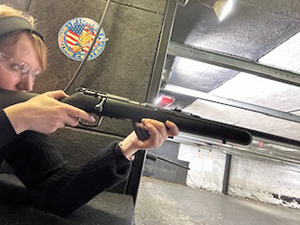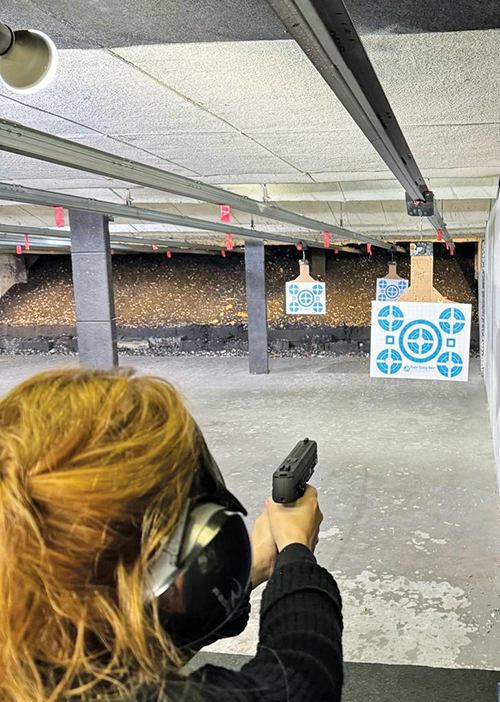
Author’s note: All of the people quoted in this article asked to remain anonymous because of the sensitive nature of the topic.
Since October 7 and the global rise of antisemitism, many more Jews in the tri-state area have been looking into ways to defend themselves. Self-defense classes have soared in popularity, with the Israeli self-defense training program Krav Maga topping the list in many communities. However, the purchase of firearms, which previously was not popular within the general New York Jewish community, has recently gained focus and interest as well. Among the Jews of Westchester, there has been a great deal of talk—and action—surrounding this subject.
Some members of the New Rochelle and Scarsdale communities have purchased shotguns for their homes. The main advantages of owning a shotgun are that, firstly, there is no license required, and secondly, shotguns spray their shells in a way that makes the shells more likely to reach their target, even if the shooter doesn’t take perfect aim. On the other hand, it’s illegal to carry a shotgun in public, so it only provides protection on the owner’s property. One man in New Rochelle said that when he bought his shotgun several weeks ago, the store owner told him that this was the last one in stock. “The Jews have been coming in and buying them all.”

Others, including some congregants of the Young Israel of New Rochelle and the Young Israel of Scarsdale, have opted instead to begin the process of obtaining “concealed carry” permits.
Concealed carry permits enable the gun owners to carry pistols (as long as they are concealed from view), in order to defend themselves in public. The legality of this type of permit is recent, since the Supreme Court struck down New York’s strict gun-carrying laws in June 2022, and declared that the right to keep and bear arms under the U.S. Constitution’s Second Amendment protects a person’s right to carry a handgun in public for self-defense. To obtain a permit, the applicant must be a U.S. citizen, at least 21 years old, and a legal resident of the state where he or she is applying.
The process to get a concealed carry permit involves several steps. First, one has to take a firearms safety course, which is 16 hours long and includes both lectures and hands-on-training. Several members of the Young Israel of New Rochelle are NRA-certified instructors. In light of recent increased demand, more courses have been created to accommodate the surge. The courses often take place in private homes, since the practice of handling and shooting is with unloaded guns.

One woman who recently completed the course in New Rochelle said: “I initially took the same class after the Tree of Life shooting, but [at that time] I couldn’t get over my fear of guns to follow through with getting one. Now, I don’t see how every Jew doesn’t have at least one.”
A man from New Rochelle, who completed the same course, said, “The class itself, though serious, felt very positive—to be sharing an experience with like-minded people.”
The woman added, “You know that you aren’t alone. It’s like being in a secret club.”
At the completion of the 16 hours of training, the applicants must take both a written test and a shooting test, with a loaded gun at a gun range. The shooting test involves demonstrating all the motions of gun safety and gun handling, and hitting the target at least four out of five times.
“Even with ear protection on, it’s so unbelievably loud,” said another woman, “and you feel each shot through your body. I’m glad I passed, and I look forward to taking more classes so I get better and better.”
A fellow classmate added, “The test was a pretty shocking experience because it was the first time I shot a loaded 9 millimeter caliber with ammo, and it has a big kick to it.”
In addition to passing both the written and shooting tests, the applicants have to fill out an application for the license. The application is not simple. It requires four different character references, and an official notary needs to sign it in seven different places. The applicants must then order their guns either in-store or online, but must keep them stored with a licensed dealer until their permit applications are approved.
An applicant explained: “The paperwork required to get a license seemed almost insurmountable, so we held a ‘neighborhood paperwork party’ on Thanksgiving morning at someone’s house. We hired two notaries to come, we all filled out one another’s character references, and the notaries were present to sign all seven places on each of our applications. This ‘party’ helped us all complete our applications within an hour, and get close to the finish line together.”
The final step in the process is an appointment with a court official (which currently can be set for approximately six months from now), who reviews the application and interviews the applicant. When going to pick up the first gun, a quick background check is performed at the store. A safe for the gun and a separate safe for the ammunition are strongly advised.
At the same time that many community members are looking into firearms, there are just as many against the idea.

One woman from New Rochelle said: “The presence of guns around me makes me feel less safe, not more safe. We should rely on our police forces and the people professionally trained in firearms to protect us. I don’t believe in taking matters into the hands of civilians. Let the professionals do their jobs.”
Her friend added: “Aren’t domestic gun fatalities one of the leading sources of death in the U.S.? Accidents happen with guns; then there’s premeditated gun violence, and things in between. When someone loses it, they do enough damage by grabbing a knife or a bat. But a gun?”
When asked about the increasing need for protection since October 7, one man answered: “On college campuses, Jews have felt threatened, and campus police weren’t there to protect them. But families in our own homes aren’t more vulnerable than we were before. I don’t look out the window and see people coming up my street and breaking into my house.”
A local resident who completed her firearms training disagreed. “We [Jews] are past the time for fear. It’s time to be brave, be strong and be prepared.”









